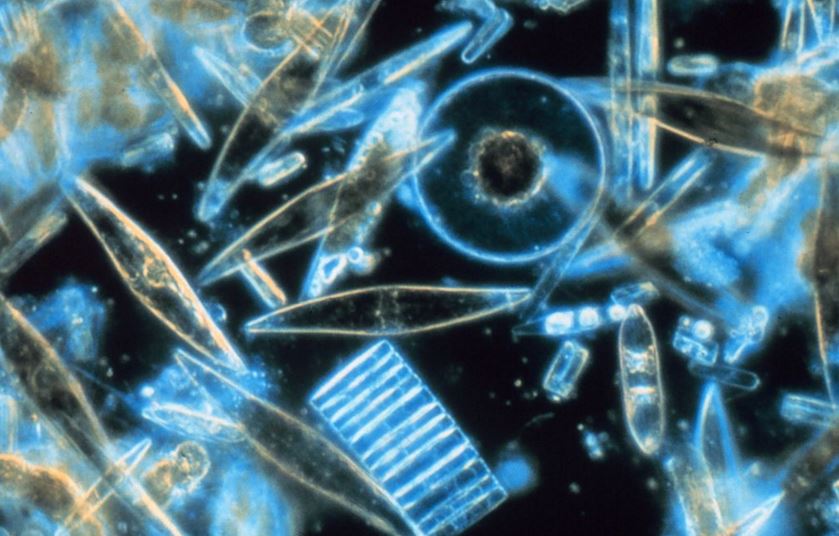Global warming could cause Earth’s atmospheric oxygen levels to drop dramatically, due to a change in the temperature of the oceans, and we would all suffocate – humans, mammals, fishes and many other living organisms might end up not being able to breathe, say scientists from the University of Leicester in England.
If oxygen levels dropped because of a change in ocean temperatures by a number of degrees, the threat of storms, droughts, rising seas, and low global food supplies would be irrelevant – oxygen deprivation would dwarf all our other problems.
The researchers published the findings from their study in the academic journal Bulletin of Mathematical Biology.
Global warming refers to the continuous warming of our oceans and atmosphere, i.e., the warming up of our planet’s surface.
 Phytoplankton photosynthesis is responsible for most of the oxygen in our atmosphere. Warmer seas could significantly undermine oxygen production. (Image: Wikipedia)
Phytoplankton photosynthesis is responsible for most of the oxygen in our atmosphere. Warmer seas could significantly undermine oxygen production. (Image: Wikipedia)
Warm oceans could undermine phytoplankton’s oxygen production
Study leader, Sergei Petrovskii, Professor in Applied Mathematics at the University’s Department of Mathematics, has demonstrated that a rise of about 6°C in the world’s oceans – which some researchers predict may occur by the end of this century – would disrupt the process of photosynthesis in phytoplankton and significantly reduce global atmospheric oxygen levels.
Phytoplankton are photosynthesizing microscopic organisms that live in the upper sunlit layer of nearly all oceans and bodies of fresh water. They produce about two-thirds of the oxygen in our atmosphere. Any change in their oxygen production alters oxygen levels in our atmosphere considerably.
Melting ice caps and changing weather may not be our greatest problems
Prof. Petrovskii said:
“Global warming has been a focus of attention of science and politics for about two decades now. A lot has been said about its expected disastrous consequences; perhaps the most notorious is the global flooding that may result from melting of Antarctic ice if the warming exceeds a few degrees compared to the pre-industrial level.”
“However, it now appears that this is probably not the biggest danger that the warming can cause to the humanity.”
“About two-thirds of the planet’s total atmospheric oxygen is produced by ocean phytoplankton – and therefore cessation would result in the depletion of atmospheric oxygen on a global scale. This would likely result in the mass mortality of animals and humans.”
Prof. Petrovskii and colleagues developed a new model of oceanic oxygen production that takes into account basic interactions in the plankton community, such as how much is produced from photosynthesis, oxygen consumption due to plankton breathing, and zooplankton feeding on phytoplankton.
Most studies have concentrated on the carbon dioxide (CO2) cycle, as CO2 is the agent primarily responsible for climate change. Very little research has been carried out on the effects global warming might have on oxygen production.
In an Abstract in the journal, the authors wrote:
“Our results indicate that the depletion of atmospheric oxygen on global scale (which, if happens, obviously can kill most of life on Earth) is another possible catastrophic consequence of the global warming, a global ecological disaster that has been overlooked.”
Citation: “Mathematical Modelling of Plankton–Oxygen Dynamics Under the Climate Change,” Yadigar Sekerci and Sergei Petrovskii. Bulletin of Mathematical Biology, pp 1-29. 25 November, 2015. DOI: 10.1007/s11538-015-0126-0.
NASA Video – Phytoplankton, the ocean’s green machines

